One of the most stereotypical images is that of a cat enjoying fresh seafood. Indeed, most of us have grown up believing that seafood is a cat’s favorite food, and we might be right.
Cats are obligate carnivores, which means that they can survive on a strict diet of animal protein. And even though humans have domesticated them for thousands of years, our feline friends have never lost their wild instincts.
If you own an open fish pond, you must have noted that the images of the fish gliding gracefully through the water often pique your cat’s curiosity.
You’ll observe your feline friend taking a predatory position each time it spots your fish moving about in their pond. The same phenomena are repeated whenever your cat picks up the movement or scent of a mouse in the house.
Compared to other pets, such as dogs, cats have refused to change their dietary preferences despite having lived among humans for such a long time. Their love affair with meat, raw or cooked, is still intact.
That’s part of the reason why we naturally tend to offer human foods to our feline friends, especially when it comes to seafood, such as shrimp.
But before you make a habit of feeding shrimps to your feline friend, you need to understand the safety concerns involved (if any). To begin with, can cats eat shrimp?
The direct answer to that question is yes, cats can eat shrimp. Like most seafood, shrimp isn’t toxic to cats, and your kitto will naturally love it. However, various factors, such as the method of preparation, could change the equation significantly.
Read on for more insights on when cats can eat shrimp and when not.
Table of Contents
What Is Shrimp?
Is shrimp bad for cats? As we’ve just mentioned, shrimp isn’t immediately toxic to cats. But before we explore how the food interacts with your cat’s body, let’s learn more about what shrimp actually is.
Shrimps fall under a taxonomic unit known as decapod crustaceans. They are characterized by their elongated bodies, long antennas, and strong tails.
Shrimps are commonly known as prawns, and like most other sea creatures, they move by swimming. And yes, shrimps are delicious too, for both man and feline.
Health and Nutritional Benefits of Shrimp
Can cats eat prawns?
Again, your kitto can eat shrimps, and there should be no immediate concerns to worry about. However, as we continue to unpack what shrimps contain, you’ll discover certain aspects of the food that make it less attractive for cats.
First, let’s examine some of the possible health and dietary benefits of offering shrimp to your feline friend.
1. Contains Antioxidants
One of the strongest selling points of shrimp is that the food is loaded with antioxidants, more particularly, the carotenoid astaxanthin.
Shrimps obtain astaxanthin from their regular diet of algae. As a matter of fact, it’s astaxanthin that accounts for shrimps’ reddish color.
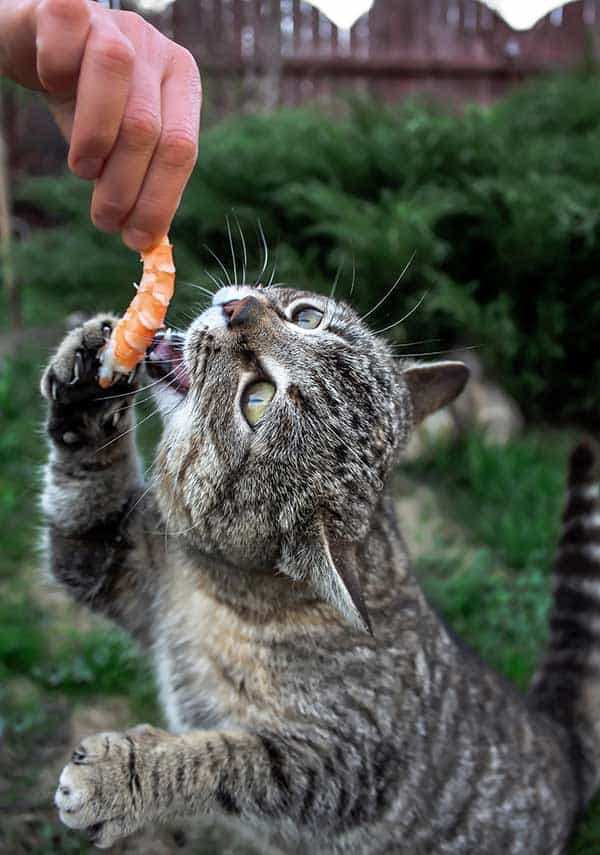
As an antioxidant, astaxanthin could benefit your cat in various ways. The antioxidant is especially hailed for its ability to relieve inflammation by preventing the oxidative stress caused by free radicals in skin cells.
Besides, astaxanthin plays a crucial role in keeping certain diseases at bay, including heart disease, diabetes, Alzheimer’s, and obesity.
High levels of this antioxidant in your cat’s body helps to increase the amount of “good” HDL cholesterol while strengthening the arteries. The net effect is a healthier heart.
2. Promotes Blood Circulation
Shrimp contains omega 3 fatty acids that are famous for promoting blood flow and circulation. Omega 3 fatty acids are also useful in enhancing the functions of the brain and the heart.
Shrimp comes with numerous other essential minerals and vitamins that perform different functions in your cat’s body.
Examples of those minerals and vitamins include;
- Protein;
- Selenium;
- Magnesium;
- Zinc;
- Phosphorus;
- Iron;
- Iodine;
- Copper;
- Sodium;
- Vitamins B3, B6 and B12; and
- Vitamin E.
Evidently, there are many ways your cat can benefit from eating shrimp. But even in the face of this information, you could still be asking yourself, is shrimp okay for cats? And considering all the nutritional elements the food contains, is shrimp good for cats?
Well, read through the next section for a few counterarguments about offering shrimps to cats. Hopefully, you’ll be able to make a more informed decision after getting acquainted with the reasons for and reasons against feeding shrimps to cats.
Common Issues Associated With Offering Shrimp to Cats
1. Shrimp Is High In Cholesterol
Shrimp may be low in calories and high in antioxidants. However, the food has a bad reputation for being notoriously high in cholesterol.
An 85-gram serving of shrimp contains as high as 166 mg of cholesterol. That is about 85% more than the cholesterol level that’s present in other types of seafood.
High cholesterol levels could affect your cat in various ways. Most commonly, cholesterol might lead to the formation of plaque in the cat’s arteries, which causes blockage in those blood vessels.
As a result, the cat’s heart has to work overtime to pump blood to various parts of the body, which significantly reduces its performance.
So, can cats get sick from eating shrimp? They sure can, and depending on the quantity of shrimp your kitto eats, it could suffer quite severe conditions.
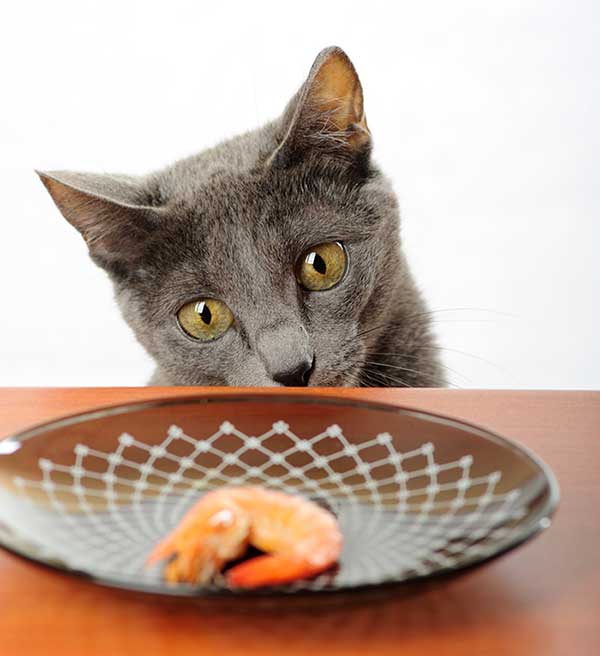
2. High Sodium Content
Besides its high cholesterol profile, shrimp also contains significant levels of sodium. This especially applies to pre-cooked shrimp, where salt is usually added as a preservative and flavor enhancer.
The early symptoms of excess sodium content in your cat’s body include frequent thirst sensation, which is normally followed by frequent urination.
If you suspect that your feline friend has eaten shrimps, and it keeps drinking water abnormally frequent, then the chances are that the cat has developed sodium ion poisoning.
It’s often easy to ignore these early warning signs, consoling yourself that the cat will recover soon. However, without urgent medical intervention, sodium ion poisoning could be fatal.
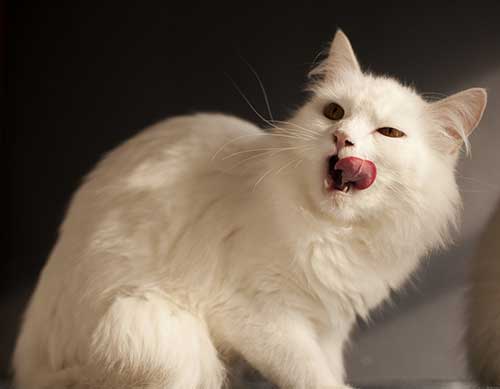
Other symptoms that you might want to watch out for include;
- Gastrointestinal complications, including nausea, loss of appetite, vomiting, and diarrhea;
- Neurological symptoms, such as body tremors and seizures; and
- Mental symptoms, such as depression.
You may also observe a generalized body weakness and seclusion tendencies. Not to mention, there could be further underlying symptoms, such as elevated body temperature and high blood pressure.
With time, sodium ion poisoning might affect your cat’s vital organs, including the heart liver, kidneys, and lungs.
3. Toxic Preservatives
Toxic preservatives are other potential dangers associated with shrimps for cats. Like excess sodium, preservatives are normally abundant in pre-cooked shrimp. Most pre-cooked human foods are usually preserved using nitrites.
Though they play an active role in enhancing the shelf life of food, nitrites have been linked to certain cancers, such as liver and colorectal cancer. You don’t want to expose your feline friend to these debilitating conditions.
4. Excess Fat
Raw shrimp is already fatty enough. Depending on the method of cooking, the food could wind up laden with more fat than your cat’s body can cope up with. The immediate consequences of high-fat foods include obesity, diabetes, and heart disease.
Also, too much fat, combined with excess salt and spices, has been linked to pancreatitis. Pancreatitis refers to the inflammation of the pancreas. The pancreas is an organ that secretes various digestive enzymes and releases those enzymes into your cat’s digestive tract.
When the pancreas is inflamed, the enzymes it secretes aren’t released into the digestive tract. Instead, those enzymes are holed up within the organ, where they begin to digest the fat that’s present in there, thereby resulting in inflammation. Some of the symptoms of pancreatitis include nausea, vomiting, diarrhea, abdominal pains, and fever.
Besides these top health issues associated with shrimp, there are also the risks of allergy to contend with. And you might be asking, can cats be allergic to shrimp?
Like humans, cats can also develop shrimp allergies. Shrimp, like all shellfish, contains a protein known as tropomyosin, which is the common trigger for most shrimp-related allergies. Other proteins in shrimp, such as hemocyanin and arginine kinase, also have the potential for triggering allergies.
Some of the symptoms of shrimp allergies include digestive issues, skin irritation, nasal congestion, and tingling in the mouth.
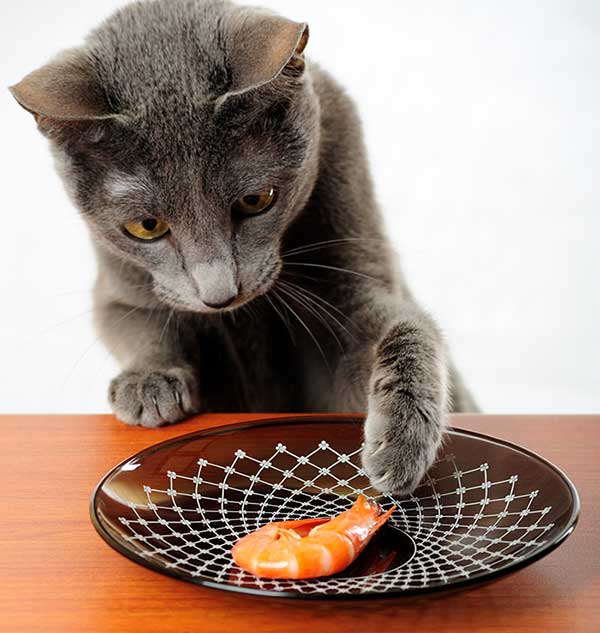
Can Cats Eat Raw Shrimp?
Should I offer shrimp to my cat raw or cooked?
Generally, cats love the smell and taste of fresh shrimp, and they won’t mind eating it raw. In fact, your cat naturally loves raw seafood.
However, there is a raft of measures to implement before offering raw shrimp to your kitto. First, ensure that you clean the food properly to remove any pathogens.
Also, you should remove the digestive tract of the shrimp, as it usually contains parasites and other potentially toxic substances that the shrimp might have eaten. Examples of common bacteria that inhabit a shrimp’s digestive tract include E.coli, listeria, and Salmonella.
What of the other parts of the shrimp, can cats eat shrimp legs?
And what about the tails, can cats eat shrimp tails? And finally, can cats eat shrimp heads?
All of these questions can be answered in a simple yes. Shrimp legs, shrimp heads, and shrimp tails are all fine for your kitto to eat. Not only are they safe for consumption, but these parts are also soft enough, so your feline friend won’t choke on them.
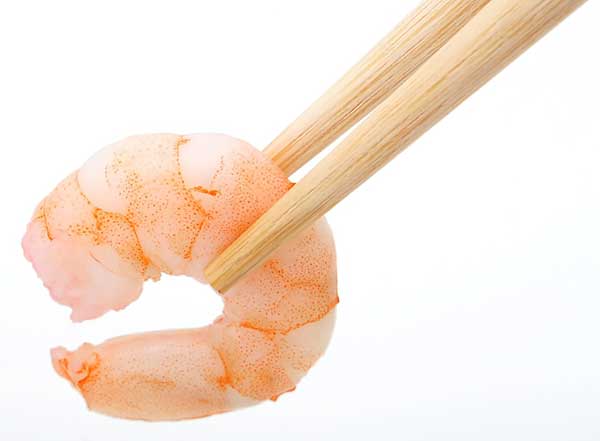
Another frequently-asked question among cat owners who are trying to add raw shrimp to their feline’s diet is, can cats eat raw shrimp shell?
Yes, shrimp shell is crispy, and cats love it that way. However, before offering shrimp shells to your kitto, ensure that the shell isn’t soaked in a brine solution.
? One crucial thing to remember when offering raw shrimp to cats is that the shrimp must not be farm-raised. Most farm-raised seafood are usually treated with antibiotics, which could present long-term health risks to your cat.
Now, some cat owners may be averse to the idea of offering raw shrimp to their cats, and might prefer cooked ones instead. But, can cats eat cooked shrimp?
Yes, there’s no problem, provided that you follow the recommended cooking methods. Generally, boil the shrimp in plain water, without adding any seasoning, spices, or excess salt. Especially avoid onions and garlic.
Besides boiling, you might also consider steaming or sautéing the shrimp. The convention is not to overcook and not to add any spices or condiments.
Does The Form Matter?
So far, we’ve only focused on raw and cooked shrimp for cats. However, shrimp comes in numerous other forms too.
First, we have frozen shrimp, and you could be wondering to yourself, can cats eat frozen shrimp?
Yes, your cat can eat frozen shrimp, provided the food was properly defrosted. There is also pre-cooked and pre-packaged shrimp. So, can cats eat pre-packaged shrimp?
When it comes to pre-packaged shrimp, your primary concern should be the kind of ingredients that are added to the shrimp.
Before buying pre-packaged shrimp, always spare some time and read up the ingredients list to ensure it doesn’t contain any substances that are discouraged for cats. Pay particular attention to the kinds of preservatives and flavorings used.

Now, pre-packaged shrimp comes in various forms, from dried to breaded, canned, and even grilled shrimp. And there are lots of questions to settle for each case.
For instance, can cats eat dried shrimp? And what about canned shrimp, can cats eat canned shrimp? Also, can cats eat breaded shrimp? And finally, can cats eat grilled shrimp?
Dried shrimps are only recommended for cats if they are not laden with toxic preservatives. Besides, the shrimp shouldn’t be too dry to choke your feline friend.
Canned shrimp is usually recommended due to its high water content. But like dried shrimp, ensure the can doesn’t contain potentially dangerous ingredients. Most breaded shrimp contains high salt and fat content, so they’re generally discouraged for cats.
Lastly, significant amounts of salt, spices, and fat are usually used when grilling shrimp. And that makes grilled shrimp a no-no for cats too.
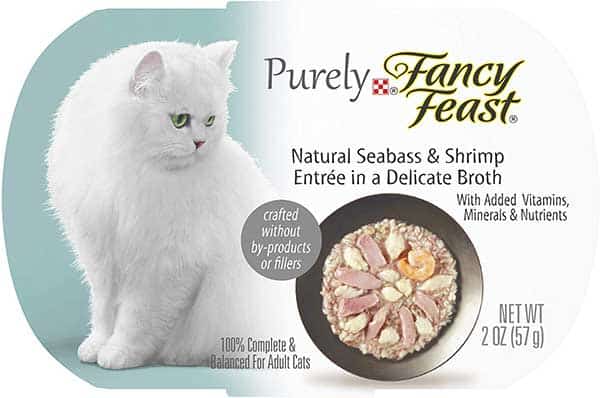
Other Frequently Asked Questions Relating to Cats and Shrimp
Can cats eat shrimp chips?
Yes, your feline friend can eat shrimp chips. All you have to do is ensure that the chips don’t contain too much salt.
Can cats eat shrimp crackers?
Yes, cats love shrimp crackers. But as is the case with most forms of shrimp that we’ve highlighted here, ensure the shrimp crackers don’t contain too much salt or any other harmful ingredients.
Can kittens eat shrimp?
The immune system of kittens isn’t as developed as that of older cats. Therefore, anything that affects adult cats adversely can take a heavier toll on kittens.
As their immune systems are still unstable and their stomachs sensitive, you should generally avoid feeding shrimp to your kittens.
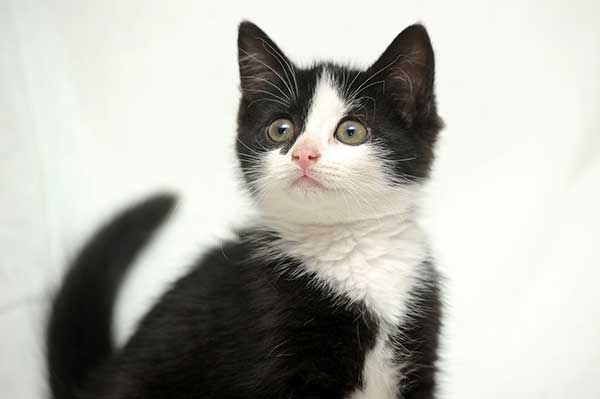
How much shrimp is safe for your cat?
If you’ve decided to offer shrimp to your cat, you may be wondering how to feed your cat shrimp.
Well, there’s no hard and fast rule here, as it depends on a couple of factors. Examples of those factors include the cat’s size and breed, age, and whether the cat is already used to shrimp or is having the food for the first time.
The conventional wisdom is to offer the cat a single shrimp per week.
Conclusion
Shrimp is a healthy treat for cats. However, it comes with a horde of health concerns. If you’re keen about feeding your cat shrimps, remember to abide by expert recommendations.
The safest way to give shrimp to cats is to ensure the shrimp is wild-caught. Then, you can offer it raw to the cat after removing the digestive tract and carefully cleaning it. Alternatively, cook the shrimp in plain water, without adding spices and extra seasoning.

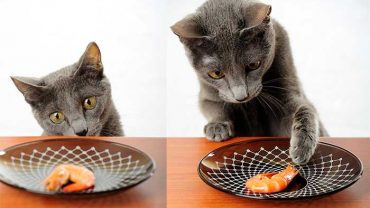

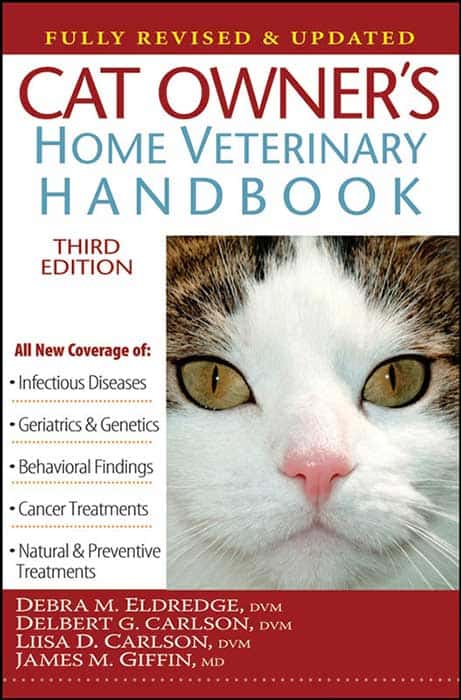


That was very informative. Thank you.